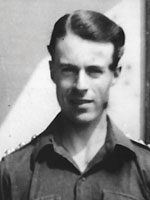|
Captain J A (Johnny) Fergusson-Cuninghame MC
Late Grenadier Guards
by Captain A W Fergusson-Cuninghame
formerly Grenadier Guards |
 My father, Johnny Fergusson-Cuninghame who has died aged 94, was born in London on 16th December 1921. His father, Major Wallace Smith Cuninghame, 2nd Life Guards, was awarded a DSO in the Great War. His mother, Ella, was the 20th and last of the Fergussons of Craigdarroch, the oldest line of Fergussons in Scotland. She died in 1929, and their father changed his two son’s surname to Fergusson-Cuninghame, in acknowledgement of the antiquity of their mother’s family. At his preparatory school, Johnny played in every team and won the cup for singing and shooting. After Eton he went up to Trinity College, Cambridge to read Classics, but his studies were curtailed by the outbreak of war. My father, Johnny Fergusson-Cuninghame who has died aged 94, was born in London on 16th December 1921. His father, Major Wallace Smith Cuninghame, 2nd Life Guards, was awarded a DSO in the Great War. His mother, Ella, was the 20th and last of the Fergussons of Craigdarroch, the oldest line of Fergussons in Scotland. She died in 1929, and their father changed his two son’s surname to Fergusson-Cuninghame, in acknowledgement of the antiquity of their mother’s family. At his preparatory school, Johnny played in every team and won the cup for singing and shooting. After Eton he went up to Trinity College, Cambridge to read Classics, but his studies were curtailed by the outbreak of war.
In the late 1940s, Johnny joined the Oxford and Buckingham Light Infantry and after Sandhurst, where he was awarded the Belt of Honour, he was commissioned into 2nd Battalion Grenadier Guards. His initial posting was to Wellington Barracks, where he got little sleep, as Humphrey Lyttleton was practising his trumpet in the opposite bedroom. Soon afterwards a brother officer, Lieutenant David Fraser, later Vice Chief of The General Staff, came into the mess and announced that Prue Blake, a beautiful brunette, had invited him to her 17th birthday party. As he had a severe cold, he asked if anyone would take his place. My father’s hand shot up and he and Prue were married in July 1946, at St Peter’s, Eaton Square.
In spring 1944, having trained for the invasion with his troop of Sherman Tanks, he was unexpectedly put in command of 5th Guards Armoured Brigade defence troop. The two officers, who subsequently took over his troop in 2nd Battalion, were both killed in action over the six months following the Normandy landings in June. Later, 5th Guards Armoured Brigade was advancing through Normandy. Johnny and his troop were being refreshed by the villagers with the powerful local calvados, when he had to answer an urgent call of nature. He hurried to a potato shed and was wholly preoccupied in the darkness, when he made out the shadowy figures of four German soldiers, who had also sought sanctuary there. With his trousers still around his ankles, he managed get out his pistol and ordered them to surrender. To his great relief they complied.
On 4th August 1944, Johnny was the liaison officer attached to 29 Armoured Brigade. 2nd (Armoured) Battalion Irish Guards were under heavy attack from German Tiger tanks south-west of Caen and had become cut off. Vehicles were unable to reach or leave the area and it was impossible to evacuate the wounded or to obtain ammunition and other vital supplies. My father arrived in a scout car from Brigade HQ and offered to find an alternative route for these vehicles if he was given 30 minutes to reconnoitre the road. While running through relentless fire from enemy tanks he was wounded by a spent bullet but refused to have it attended to. Later on he helped an ambulance convoy to safety. After six lorries had been marked with red crosses and loaded with wounded men, he led the column out of the area to a Casualty Clearing Post. They had to move very slowly along a pot-holed and cratered road, but the Germans fired only at the last vehicle and all the casualties got through. He was awarded an MC and the citation paid tribute to his courage and total disregard for his own safety.
After “The Battle of The Bulge” in The Ardennes, he was due for some leave. There was only one place left on the next draft and he and a brother officer tossed a coin to decide which of them should go. My father lost. A few miles along the road the draft was ambushed by a group of Hitler Youth. There were no survivors.
In 1949, he resigned from the Army and farmed in Gloucestershire before moving to Hertfordshire. In 1966 he returned to Caprington his old home in Ayrshire. He leased a sporting estate on the Isle of Harris, where he broke The Lodge record by catching nine salmon in three hours. He subsequently returned to Gloucestershire, where he took part in local activities, as well as building up the Dudgrove Fishing Syndicate on the River Colne, owned by John Peel, formerly Grenadier Guards, that has given so much fun to so many over the years.
My mother died in 2011. My father is survived and much missed by myself, my brother Jamie, my two sisters, Jane and Sophie, and his four grandchildren.
God grant that I may fish, until my dying day
And when I’ve taken my last cast, I then do humbly pray,
When in The Lord’s safe landing net, I’m peacefully asleep,
That in His Mercy, I am judged, as good enough to keep. |
|
|